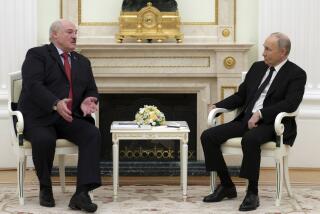Geneva Gets a Day in Spotlight : Scene: ‘Usually it is very boring here,’ an Iraqi correspondent says. Anti-war protests are held despite police restrictions.
- Share via
GENEVA — This serene Swiss lake city, cradled in the snow-capped Jura mountain range and the French Alps, had been spruced up for the important talks Wednesday between U.S. Secretary of State James A. Baker III and Iraqi Foreign Minister Tarik Aziz.
The famous spouting water jet in the center of Lake Geneva, normally turned off in winter, was specially activated so that television anchormen from around the world would have a postcard setting for their somber stand-up pronouncements. Likewise, John Calvin’s church atop the hill in the old city was bathed in spotlights--something the austere Calvin would likely have opposed.
In the steel-and-glass, 18-story Inter-Continental Hotel--the setting for hundreds of critical diplomatic meetings over the years--hotel officials discreetly removed the Persian Salon name from a carpet store and renamed it the Swiss Salon to avoid offending the Iraqis, who fought an eight-year war with the Persians of Iran.
But once the discussions began in a ground-floor conference room, all the preparations and protocol niceties gave way to the main show of the day, the “last-chance” meeting between Baker and Aziz.
The tension showed on the faces of nearly everyone involved in the talks. Reporters scrambling to confirm a rumor of a break four hours into the talks rushed to the bank of elevators in the lobby area. When the elevator door opened, they were greeted by the vision of a pale, obviously drained Baker and his aides silently ascending to their 18th-floor suites. The American and his staff remained motionless, framed in the elevator opening for a surreal moment that spoke of fatigue and the great stakes at play here, before the doors finally closed.
By the time of their back-to-back, end-of-the-day press conferences, Baker and Aziz appeared weary but respectful of each other. In their conferences, despite the chasm separating their countries’ policies, both men took time to praise the politeness and tone of the other.
Baker, in fact, said the changed tone was the only new development of the talks. Aziz was much more critical of the language contained in a letter that President Bush tried to send, by way of Baker, to Iraqi leader Saddam Hussein than he was of anything Baker had to say. He complimented Baker’s “professionalism.”
The day started with a hitch when Aziz, after striding resolutely from his 14th-floor suite at the Inter-Continental Hotel to begin the talks, got stuck for several minutes in the elevator.
At stake were issues of war and peace, but the elevator, with a maximum capacity of 15 persons or 2,250 pounds, would not budge until several hulking Iraqi bodyguards accompanying Aziz and Swiss security officers agreed to get off. As it turned out, it may have been the most important negotiated compromise of the day.
Few people had given the talks much chance of lasting very long. An informal pool among the 20 American reporters accompanying Baker on his trip here had produced guesses ranging from 15 minutes onward.
All were wrong. The talks, interrupted once for lunch and once for a rest break, lasted six hours and 27 minutes. The two Iraqi reporters covering the talks--compared with more than 1,000 American and European journalists--were also surprised by the duration and several times had to revise their stories to the government-controlled Iraqi News Agency in Baghdad.
“Usually it is very boring here,” explained Iraqi News Agency correspondent Al Jamil Majed Makki, who is based in Geneva. “The days and weeks go by with little stories that only a few people read. Then, something like this comes and the whole world is watching.”
For the first time in years, a rarely used law banning public demonstrations was invoked by the Swiss police so that the negotiators would not be disturbed by unruly mobs. Despite the precaution, demonstrators paid little attention to the police and held their anti-war protests anyway, including candlelight vigils and songfests.
Only a few hundred feet from the hotel meeting site, diplomats and employees at the Kuwaiti Embassy staged an all-day, anti-Iraq demonstration.
More to Read
Sign up for Essential California
The most important California stories and recommendations in your inbox every morning.
You may occasionally receive promotional content from the Los Angeles Times.












